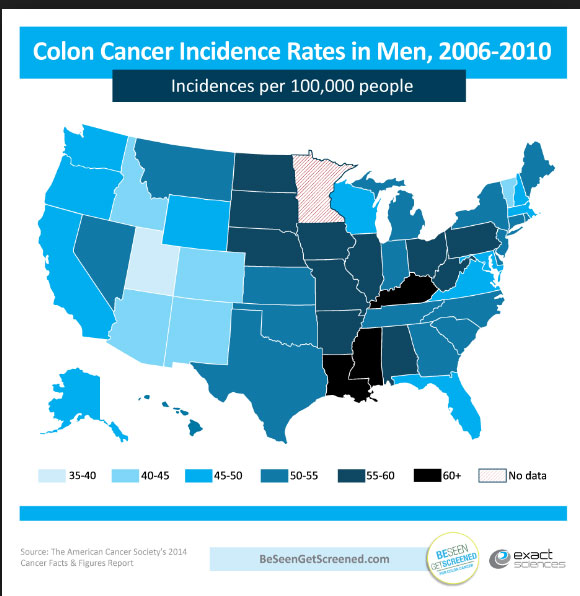
Miami, United States | AFP |
Colon and rectal cancer rates are rising sharply among young and middle-aged adults in the United States but doctors have yet to pinpoint why, researchers said Tuesday.
Generation X and millennials face anywhere from two to four times the risk of colon and rectal cancer as their baby boomer counterparts, a report in the Journal of the National Cancer Institute found.
The study did not uncover a reason for the change. Experts say colon and rectal cancer can be inherited and also influenced by the high-fat, low fiber diets that are common in the Western world.
“Our finding that colorectal cancer risk for millennials has escalated back to the level of those born in the late 1800s is very sobering,” said lead author Rebecca Siegel, a researcher with the American Cancer Society.
“Educational campaigns are needed to alert clinicians and the general public about this increase to help reduce delays in diagnosis, which are so prevalent in young people, but also to encourage healthier eating and more active lifestyles to try to reverse this trend.”
– Rising incidence –
Colon cancer incidence rates increased by one to two percent per year from the mid-1980s through 2013 in adults ages 20 to 39, the study found.
For adults aged 40 to 54, rates increased by 0.5 to one percent annually from the mid-1990s through 2013.
The rise has been more pronounced for rectal cancer, climbing about three percent per year from the mid-1970s in people aged 20 to 39.
In adults between 40 and 54, rectal cancer rates increased by two percent per year from the 1990s to 2013.
In general, rectal cancer rates in adults age 55 and older have been declining for the past four decades.
Three in 10 rectal cancer diagnoses are now made in patients under 55.
Dean Pappas, co-chief of colon and rectal surgery at Winthrop-University Hospital in New York, called the study “very alarming,” saying its findings mirror the increasing numbers of younger patients he sees in his own practice.
“Colorectal cancer takes many years to develop,” he said. “It is not a particularly fast-growing type of tumor.”
That experts do not know why they are seeing more cases than before is also troubling, he added.
“We don’t really understand the biology of colorectal cancer,” he said. “So it is hard to predict who is going to get it or not.”
– Screening changes? –
Screening for colorectal cancer with an invasive colonoscopy is generally not recommended for people under age 50 unless they have a family history of the disease.
The study stopped short of recommending any change to the recommended start of screening by age 50.
But Siegel suggested current practices may deserve a second look given that some 10,400 new cases of colorectal cancer in 2013 were diagnosed in people in their 40s.
“These numbers are similar to the total number of cervical cancers diagnosed, for which we recommend screening for the 95 million women ages 21 to 65 years,” she said.
Her study was based on patient data on more than 490,000 people from US cancer registries.
Patrick Okolo, chief of gastroenterology at Lenox Hill Hospital in New York, said that although the study shows a “persisting and worrisome trend,” the increased cancer rate is probably not enough to prompt a change in practice given the high cost of screenings.
“The truth of the matter is despite this recent study, the numbers are still too small to warrant a change in screening policy,” said Okolo, who was not involved in the research.
That may change if the cost of screening continues to drop as it has in recent years, and as less-invasive methods — such stool-sample analysis — become more widespread.
Although the rising colon cancer rate “is clearly the kind of thing we are seeing in westernized countries,” Okolo said, comparisons are difficult because less-developed nations often keep less-detailed health records.
Besides genetics, risk factors include consumption of processed meat, not exercising enough and rising body-mass index, he added.
“Whatever is driving obesity is likely the same set of factors that may be driving this trend in colorectal cancer.”
 The Independent Uganda: You get the Truth we Pay the Price
The Independent Uganda: You get the Truth we Pay the Price



